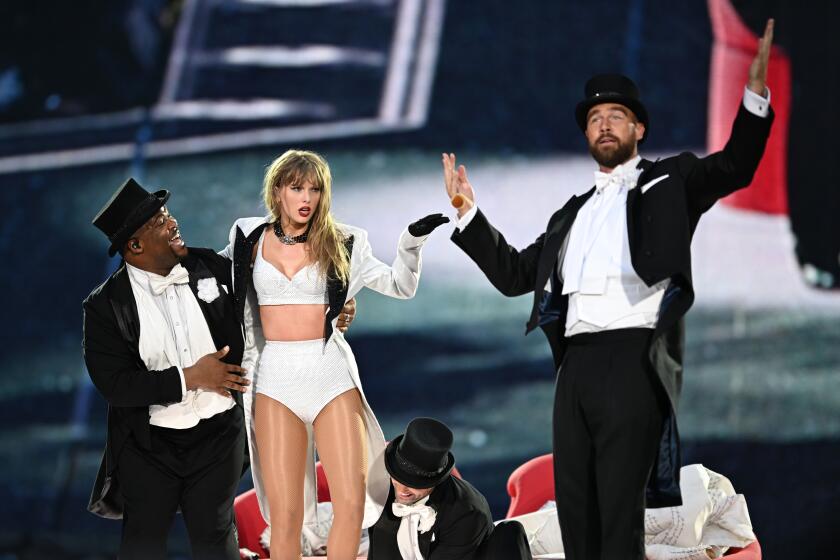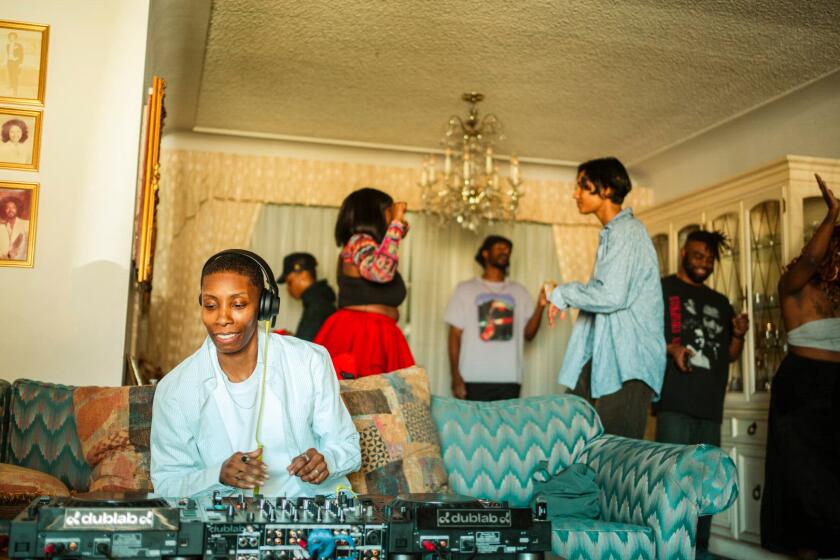Snap, Crackle, ‘Pop’
Dance . . . techno . . . disco . . . samples . . . loops . . . trip-hop.
Those are terms likely to be heard over and over in discussions of U2’s strikingly ambitious new “Pop” album--a work whose supercharged textures were inspired in part by the energy and experimentation of the British electronic music scene.
Ultimately, however, it’s the songs that matter most, and U2 delivers another splendid collection--a set of mostly thoughtful, probing works that explore questions of personal and spiritual ideals and doubts.
“Discotheque,” the hit single, opens the album on a deceptively dizzy, disorienting note. Except for the title word, it’s hard to make out exactly what Bono is singing the first few times you hear the record or see the video (where the band dresses up playfully in Village People attire).
One reason is that his vocal is secondary to a mechanical series of rhythms--a move that seems linked to the most anonymous ‘70s disco. That’s a jarring connection for anyone who prizes the richness and self-affirmation of U2’s eloquent “The Joshua Tree”-era soundscapes of a decade ago.
Even when the words become clear, many are such light throwaways that they sound strange from the man identified with such earnest, inspiring songs as “Pride (in the Name of Love)” and “One.” This time, a more typical sentiment is: “You just can’t get enough of that lovey-dovey stuff.”
In “Discotheque,” however, U2 uses the intoxicating dance-club experience--where the overpowering rhythms make it hard to hear the person next to you and the garish, flashing lights often make it hard to see clearly what is going on--to underscore some of the mysteries and obsessions of life itself.
After that opening cocktail, the Irish band--working with English producer Flood--takes us on a pair of journeys.
The first is thematic and examines many of the moral or psychological issues that have long interested the band. The second is a musical trip built around the challenge that the band set for itself on the album: bridging the wide gap between the electronic dance club world as represented these days by such bands as Prodigy and Underworld and the classic pop-rock songwriting tradition that has been revived in Britain by Oasis’ Noel Gallagher.
“Pop” benefits from the tension of these competing influences, sometimes leaning more on the electronic currents, elsewhere showcasing the more melodic and accessible songwriting strengths, as in the gloriously appealing “Staring at the Sun,” which is the album’s second single. Whatever the direction, guitarist the Edge, bassist Adam Clayton and drummer Larry Mullen respond with precision and power.
One of the album’s most commanding moments is “Mofo,” a number in which the twin forces collide to give us a track with the urgent dance power of Prodigy and subject matter that recalls the deep-rooted sense of parental loss expressed in John Lennon’s gripping “Mother.”
In exploring contemporary beats, U2 still finds room for some of its American roots touches, from the distant country echoes in “If God Will Send His Angels” to the bluesy backdrop of “The Playboy Mansion,” which deals most clearly with the lure of transient versus enduring values.
The latter song is peppered with rhymes that speak provocatively of the times: “If beauty is truth / And surgery the fountain of youth” and “If perfume is an obsession / And talk shows . . . confession.”
The most daring--and defining--moment in the album is saved for last. In “Wake Up Dead Man,” Bono wrestles with his own faith, touching on the “God is dead” proposition to ask him for an explanation of some of the contradictions and heartaches in life. It’s a stark, minimalist track that stands about as far from the public exhibitionism of “Discotheque” as you would ever expect from two songs on the same album.
It is such boldness that has enabled U2 to remain at the creative forefront of pop music for more than a decade. Whatever concerns the outwardly trendy “Discotheque” may have raised among U2 fans about the direction of the band, “Pop” is another major and satisfying step in a remarkable body of work.
(BEGIN TEXT OF INFOBOX / INFOGRAPHIC)
**** U2 “Pop,” Island
Albums are rated on a scale of one star (poor) to four stars (excellent).
*
* TALKING WITH BONO
U2’s singer discusses the sound explored on “Pop.” Page 71
*
Hear New U2
* Excerpts from “Pop” are available on The Times’ World Wide Web site. Point your browser to: https://www.latimes.com/soundclips
More to Read
The biggest entertainment stories
Get our big stories about Hollywood, film, television, music, arts, culture and more right in your inbox as soon as they publish.
You may occasionally receive promotional content from the Los Angeles Times.






